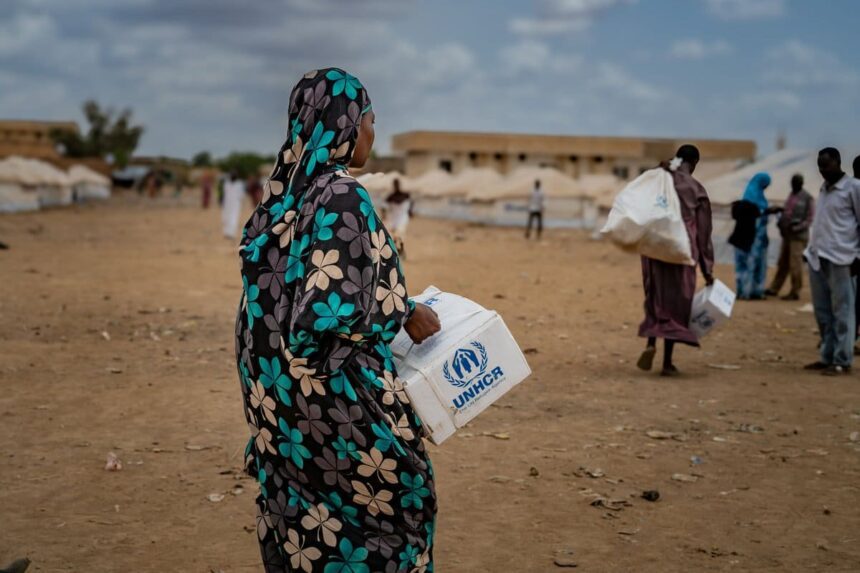For the second time in less than a year, the IPC Famine Review Committee (FRC) has confirmed that famine is unfolding in parts of Sudan, with El Fasher in North Darfur and the besieged town of Kadugli in South Kordofan classified as being in IPC Phase 5 (Famine) as of September, marked by total livelihood collapse, starvation, extreme malnutrition, and rising deaths
Conditions are expected to persist through January 2026, as after 30 months of conflict and insecurity, around 21.2 million people in Sudan are facing severe food insecurity at the peak of the lean season, including 6.3 million in Emergency conditions and 375,000 enduring Catastrophe-level hunger.
“Uncertainty surrounding the evolution of conflict heightens the risk of Famine, particularly in 20 areas expected to receive displaced populations across North, South, and East Darfur, as well as West and South Kordofan,” the report warned.
Since 26 October, “the change in control of El Fasher town has resulted in widespread human suffering and further displacement toward Tawila and other neighbouring areas, exacerbating humanitarian needs.”
Following the Rapid Support Forces (RSF) militia’s takeover of El Fasher last week after more than 500 days of siege, the UN said that hundreds of civilians, including humanitarian workers, have been killed, and many others are trapped behind barricades.
The city of El-Fasher remains completely sealed off, with food, medicine, and relief supplies blocked, despite repeated urgent appeals for humanitarian access.
At the peak of the lean season in September 2025, an estimated 21.2 million people, 45 percent of Sudan’s population, faced high levels of acute food insecurity (IPC Phase 3 or above), including 6.3 million in Emergency (IPC Phase 4) and 375,000 in Catastrophe (IPC Phase 5).
While this marks a slight decline of 3.4 million people from the previous IPC analysis, improvements were “largely due to gradual stabilisation, reduced conflict and improved humanitarian access in Khartoum, Al Jazirah and Sennar since April 2025.”
However, “most localities in Greater Darfur and Greater Kordofan experienced a sharp deterioration in food security due to active conflict and restricted access,” the IPC noted.
Around 3.6 million people in these regions faced Emergency (IPC Phase 4) and 370,000 faced Catastrophe (IPC Phase 5), “accounting for 98 percent of the total population in this phase nationwide.”
The report projected that “favourable agroclimatic conditions will likely improve the food security situation after the harvest,” reducing the number of people in IPC Phase 3 or above to 19.2 million (40 percent) between October 2025 and January 2026.
Yet, in North Darfur and the Western Nuba Mountains, gains will remain limited due to ongoing conflict, while displaced households and returnees are unlikely to benefit meaningfully from the harvest due to the loss of their assets.
The IPC warned that “acute malnutrition remains a serious concern,” with over 60 percent of surveyed areas showing Global Acute Malnutrition (GAM) rates above 15 percent, and “four in Greater Darfur showing prevalence around or above the 30 percent famine threshold.”
Calling it a “man-made emergency,” the FRC urged that “only a cessation of hostilities can prevent further loss of life and help contain the extreme levels of acute food insecurity and acute malnutrition.”
It also called for unimpeded humanitarian access, protection of civilians, and increased funding to scale up life-saving assistance.
Reacting to the IPC report, the World Health Organization (WHO) said, “Only a ceasefire and unimpeded humanitarian access can prevent further deterioration and save lives. Above all, the people of Sudan need peace.”
Meanwhile, on Monday, the Office of the Prosecutor of the International Criminal Court (ICC) expressed profound alarm and deep concern over reports of mass killings, rapes, and other crimes allegedly committed during the Rapid Support Forces’ (RSF) attacks in El-Fasher, Sudan.
The Office said these atrocities appear to form part of a broader pattern of violence that has plagued the Darfur region since April 2023, warning that such acts, if verified, may constitute war crimes and crimes against humanity under the Rome Statute.
Recalling UN Security Council Resolution 1593 (2005), which grants the ICC jurisdiction over crimes committed in Darfur, the Prosecutor’s Office confirmed it is actively investigating violations that have occurred since the conflict’s escalation in April 2023.
According to its latest report to the UN Security Council, the Office has intensified efforts through field missions, engagement with victims and civil society, and collaboration with national and international partners.
The ICC is taking immediate steps to preserve and collect evidence related to the alleged atrocities in El-Fasher for potential future prosecutions.
Citing the recent conviction of Janjaweed leader Ali Muhammad Ali Abd-Al-Rahman (Ali Kushayb) for similar crimes in Darfur in 2004, the Office reiterated that this serves as a warning to all parties in the current conflict that accountability will follow such grave violations.
The Office has also urged individuals and organisations with relevant information or evidence regarding the events in El-Fasher to submit it securely via the OTP Link platform.
Sudan is currently enduring one of the world’s most severe humanitarian disasters due to an ongoing civil war that began on April 15, 2023.
The conflict pits the Sudanese Armed Forces (SAF), led by General Abdel Fattah al-Burhan, against the paramilitary Rapid Support Forces (RSF), commanded by General Mohamed Hamdan Dagalo (Hemedti).
The UN Office for the Coordination of Humanitarian Affairs (OCHA) has condemned the continued obstruction as “unacceptable,” urging authorities to allow immediate and safe passage for aid convoys to reach civilians trapped in the conflict zone.
According to the International Organization for Migration (IOM), nearly 71,000 people have fled El-Fasher and surrounding areas since late October, many recounting killings, abductions, and sexual violence during their escape.
Most displaced families have sought refuge in Tawila, about 70 kilometres away, where conditions are dire, people are sleeping in the open, food stocks are nearly exhausted, and clean water is scarce.
Meanwhile, in neighbouring Kordofan, violence has also intensified in recent days, forcing tens of thousands more from their homes, further worsening Sudan’s deepening humanitarian crisis.
The post Sudan’s El Fasher, Kadugli face second famine in less than a year appeared first on Maktoob media.













